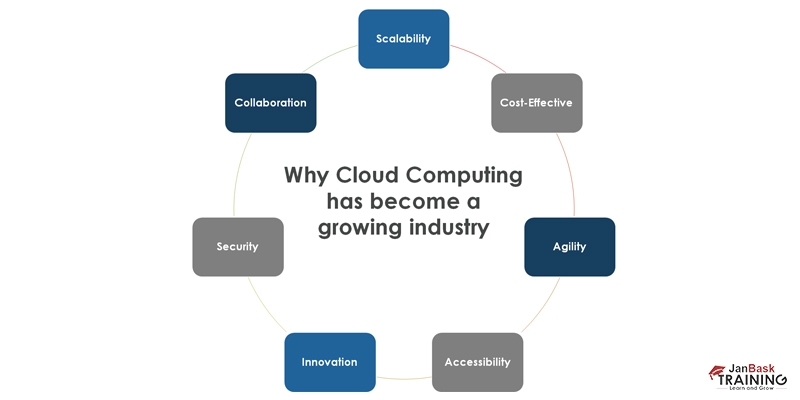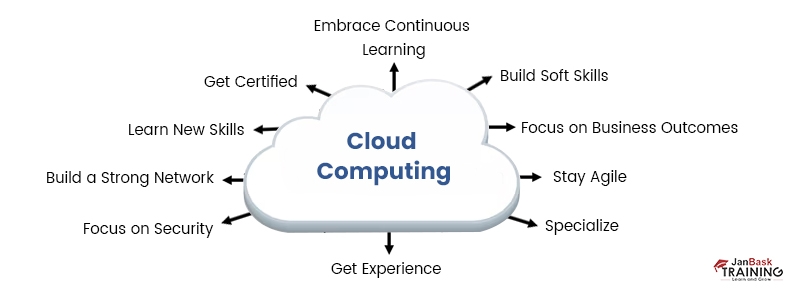29
DecChristmas Offer : Get Flat 50% OFF on Live Classes + $999 Worth of Study Material FREE! - SCHEDULE CALL
Cloud computing has been one of the fastest-growing industries over the last decade, with the market expected to reach $1 trillion by 2025. More businesses are turning to cloud computing for their computing needs as technology advances. This has led to a surge in demand for cloud computing professionals who can design, implement and manage cloud infrastructure.
It has revolutionized the way businesses operate and opened up a world of opportunities for individuals looking for a career in the technology industry. As more companies adopt cloud computing, the demand for professionals with cloud computing skills and experience rapidly increases.
In this blog, we'll take a closer look at cloud computing as a career, including 10 ways you can use to fuel your career in cloud computing: the skills you need to succeed, the available job opportunities, and the field's future outlook.
Over the internet, cloud computing delivers computing resources, including servers, storage, databases, networking, software, analytics, and intelligence.
Cloud computing allows businesses to access and use these resources on demand rather than purchasing and maintaining their physical infrastructure.
The benefits of cloud computing are numerous. For businesses, it provides increased flexibility, scalability, and cost savings. With cloud computing, businesses can quickly and easily provision resources as needed without investing in their physical infrastructure. This allows companies to scale up or down as required, depending on changing demands.
Cloud computing also provides excellent reliability and availability. With traditional on-premises infrastructure, businesses need to have redundant systems to ensure their systems are always available. With cloud computing, the cloud service provider takes care of this, ensuring that services are always available and backed up.
For individuals who are looking to build a career in cloud computing provides a wealth of opportunities. As businesses adopt cloud computing, there is a growing demand for professionals with cloud computing skills and experience.

Cloud computing has become a growing industry for several reasons. One of the key reasons is its multiple benefits, like cost savings, scalability, accessibility, security, and innovation. Organizations across various sectors are increasingly adopting cloud computing solutions to optimize their operations, improve efficiency, and enhance customer experiences.
Here are some of the key factors driving this growth:
Now you know the importance of cloud computing, so let’s look at the necessary skills that will be required to build a career in cloud computing.
To succeed in a career in cloud computing, you need to have a strong foundation in technology, including a deep understanding of networking, operating systems, and programming languages. In addition, you need to have experience working with cloud computing platforms, such as Amazon Web Services (AWS), Microsoft Azure, or Google Cloud Platform (GCP).
Here are some of the critical skills and experience required for a career in cloud computing:

Cloud computing is a rapidly growing field with many opportunities for professionals looking to build careers in this space. As more businesses adopt cloud computing, the demand for skilled professionals increases. Here are ten ways to fuel your career in cloud computing:

1. Get Certified: One of the best ways to demonstrate your skills and knowledge in cloud computing is to get certified. Several cloud computing certifications are available, including AWS Certified Solutions Architect, Certified Azure Solutions Architect, and Google Certified Professional Cloud Architect.
Several certifications in cloud computing can help professionals validate their skills and demonstrate their expertise in this field.
Here are some of the top cloud computing certifications:
2. Learn New Skills: Cloud computing is a rapidly evolving field, and keeping up with the latest trends and technologies is essential. Take courses or attend conferences to stay updated with new developments in cloud computing.
3. Build a Strong Network: Networking is crucial in any field, and cloud computing is no exception. Attend industry events, connect with other professionals on social media platforms, and join industry groups to build relationships and expand your network.
4. Focus on Security: Security is a top priority for businesses using cloud computing, so it's essential to have a solid understanding of cloud security concepts. Learn about encryption, access controls, and other security measures used in cloud computing environments.
5. Get Experience: Experience is essential in cloud computing, and it's important to gain hands-on experience working with cloud platforms like AWS, Azure, or GCP. Look for opportunities to work on cloud-based projects at your current job or through volunteer work.
6. Specialize: There are many different areas within cloud computing, so it's a good idea to specialize in one or more locations. This could include cloud security, cloud architecture, or cloud development.
7. Stay Agile: Cloud computing is all about agility, and adapting quickly to changing business needs is essential. Learn about Agile methodologies, including DevOps, and be prepared to work in a fast-paced environment.
8. Focus on Business Outcomes: While cloud computing is a technical field, it's important to remember that the ultimate goal is to help businesses achieve their goals. Focus on delivering solutions that meet business needs rather than just focusing on technical requirements.
9. Build Soft Skills: Soft skills are as necessary as technical skills in cloud computing. Develop strong communication, collaboration, and problem-solving skills to be successful in this field.
10. Embrace Continuous Learning: Finally, remember that cloud computing is a rapidly evolving field, and embracing continuous learning is essential. Stay current with the latest technologies, attend industry events, and take courses to continue growing and developing your skills.
Cloud computing has become an integral part of the modern business landscape, and as a result, there is a growing demand for skilled professionals in this field. In the United States, the Bureau of Labor Statistics predicts that employment of computer and information systems managers, including Cloud Architects, will grow 10 percent from 2021 to 2031, which is much faster than the average for all occupations.
Here are some of the top job opportunities in cloud computing:
1. Cloud Architect: Cloud architect design and implement cloud-based solutions for businesses. They are responsible for developing cloud strategies, selecting the right cloud platforms and services, and ensuring cloud solutions' scalability, reliability, and security.
2. Cloud Engineer: Cloud engineers build and maintain cloud infrastructure for businesses. They are responsible for setting up and configuring cloud environments, managing cloud resources, and ensuring the performance and availability of cloud-based systems.
3. Cloud Developer: Cloud developers develop and deploy applications in cloud environments. They are responsible for writing code optimized for cloud platforms, integrating applications with cloud services, and ensuring the scalability and reliability of cloud-based applications.
4. Cloud Security Specialist: Cloud security specialists are responsible for ensuring the security of cloud-based systems. They develop and implement security policies, perform risk assessments, and monitor cloud environments for security threats.
5. Cloud Operations Manager: Cloud operations managers oversee the day-to-day management of cloud environments. They are responsible for managing cloud resources, ensuring the availability and performance of cloud-based systems, and troubleshooting issues that arise in cloud environments.
6. Cloud Consultant: Cloud consultants provide guidance and advice to businesses on how to adopt and use cloud technologies effectively. They help businesses select the right cloud platforms and services, develop cloud strategies, and ensure the security and compliance of cloud-based systems.
7. Cloud Sales Manager: Cloud sales managers sell cloud solutions to businesses. They develop sales strategies, identify potential customers, and build relationships with key stakeholders to drive sales and revenue growth.
8. Cloud Support Engineer: Cloud support engineers provide technical support to businesses using cloud-based systems. They troubleshoot issues that arise in cloud environments, provide advice on how to use cloud technologies effectively and ensure the availability and performance of cloud-based systems.
9. Cloud Data Analyst: Cloud data analysts analyze data stored in cloud environments to provide insights and inform business decisions. They develop models, analyze data, and present findings to key stakeholders.
10. Cloud Trainer: Cloud trainers provide training and education to businesses and professionals on using cloud technologies effectively. They develop training programs, deliver training sessions, and provide support and guidance to help businesses make the most of cloud-based systems.
There are many benefits to pursuing a career in cloud computing. Here are some of the most significant:

In conclusion, cloud computing is a rapidly growing field with many opportunities for professionals looking to build careers. To be successful in cloud computing, it's essential to stay up to date with the latest trends and technologies, gain hands-on experience, specialize in one or more areas, and develop solid and soft skills. With the right skills and experience, you can build a rewarding and fulfilling career in cloud computing.
Our experts at JanBaskTraining have trained thousands of professionals and students in Cloud Computing, Data Management, Cyber Security, Data Science, and Business Intelligence, helping them to gain powerful skills in their desired fields which helped them to land high-paying jobs.
Our sole aim is to provide the best training courses to our students and professionals looking to advance their careers in IT and other computer engineering fields. JanBask delivers high-quality training modules and live classes of industry experts with trending industry standards.
Tolearn more about Cloud Computing as a career, connect to us now.
AWS Solution Architect Training and Certification

Q1. What are the different types of cloud computing?
Ans:- There are three main types of cloud computing: public cloud, private cloud, and hybrid cloud. The public cloud is owned and operated by a third-party provider, the private cloud is owned and operated by a single organization, and the hybrid cloud combines public and private clouds.
Q2. What are the potential drawbacks of cloud computing?
Ans:- Potential drawbacks of cloud computing include security concerns, loss of control, dependence on the internet, potential downtime, and limited customization.
Q3. How is cloud computing different from traditional on-premise IT solutions?
Ans:- Cloud computing differs from traditional on-premise IT solutions because it offers scalability, cost-effectiveness, accessibility, and agility that is not typically possible with on-premise solutions. Additionally, a third-party provider typically manages and maintains cloud computing solutions.
Q4. How is data stored in cloud computing?
Ans:- Data in cloud computing is typically stored in a distributed manner across multiple servers and data centres. This provides redundancy, scalability, and high availability.
Q5. How can I ensure the security of my data in the cloud?
Ans:- To ensure the security of your data in the cloud, it is vital to use strong authentication and access control measures, encrypt data in transit and at rest, monitor and audit access, and implement backup and disaster recovery plans.
Q6. How can I get started with cloud computing?
Ans:- To start with cloud computing, you can sign up for a free trial of a cloud computing provider such as Janbask. You can also explore online training resources, certifications, and communities on Janbask to learn more about cloud computing.
The JanBask Training Team includes certified professionals and expert writers dedicated to helping learners navigate their career journeys in QA, Cybersecurity, Salesforce, and more. Each article is carefully researched and reviewed to ensure quality and relevance.

Cyber Security

QA

Salesforce

Business Analyst

MS SQL Server

Data Science

DevOps

Hadoop

Python

Artificial Intelligence

Machine Learning

Tableau
Interviews